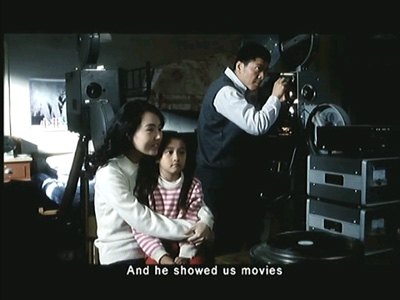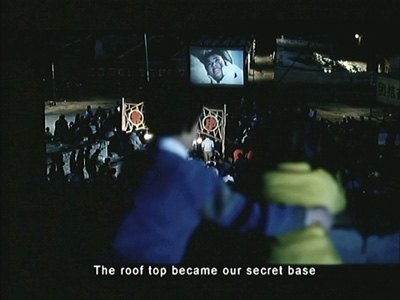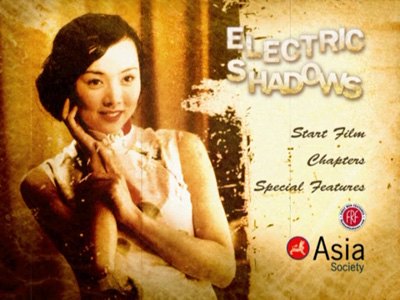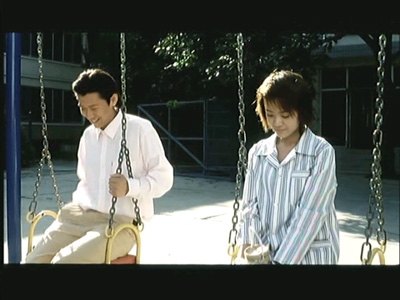| Reviews & Columns |
|
Reviews DVD TV on DVD Blu-ray 4K UHD International DVDs In Theaters Reviews by Studio Video Games Features Collector Series DVDs Easter Egg Database Interviews DVD Talk Radio Feature Articles Columns Anime Talk DVD Savant Horror DVDs The M.O.D. Squad Art House HD Talk Silent DVD
|
DVD Talk Forum |
|
|
| Resources |
|
DVD Price Search Customer Service #'s RCE Info Links |
|
Columns
|
|
|
Electric Shadows
THE MOVIE:

No other genre of entertainment can write a love letter to itself the way movies can. In music, bands can do covers albums, but they often stumble in their song choices or try too hard and come off as bad karaoke. In literature, an author can evoke a style or explain what he or she loves about a book but is rarely given the opportunity to share actual passages from the work being referenced. Motion pictures, however, have the ability to make other movies an experience within an experience. Characters can sit in a theatre and watch a movie, and the audience watching them can see the scenes they see. The director can insert the film she is alluding to into his viewer's consciousness and use the surrounding action to draw out the same reaction she is inspiring in her fictional world. Think Cinema Paradiso, Bertolucci's The Dreamers, etc.
The Chinese title for Electric Shadows is Dianying, and its literal translation is "cinema." Electric Shadows is a more fitting title as it's the poetic translation, and the film itself is first-time director Xiao Jiang's poetic rumination on her own childhood raised on a steady diet of motion pictures. While not strict autobiography, the introduction she penned for the DVD reveals that the seeds of the story were plucked from reality, and the personal emotion comes through on the screen.
Electric Shadows opens with Mao Dabing (Yu Xia) riding his bike on his bottled water delivery route. Through voiceover, he explains that he works mainly to feed his film habit. (DVD addicts will wince when they hear that a ticket to a film costs Mao Dabing three or four days of wages. You'd have a much smaller collection, my friend.) In a hurry to get to the theatre, he lets his mind wander and ends up crashing into a rickety brick wall, knocking it down. A girl (Zhongyang Qi) emerges and angrily smashes a brick against his head. Once Dabing wakes up, he finds himself in the hospital and the girl at the police station. Her name is Ling Ling, and she's deaf. She's also very demanding, and she insists Dabing go to her apartment and feed her fish while she is incarcerated.
It's when Dabing arrives at Ling Ling's home that Electric Shadows gets underway. Her apartment is filled with film memorabilia, including a projector and theatre seats. The walls are lined with iconic images from classic Chinese cinema, pictures that will pop up again and again throughout Electric Shadows. They are almost like a map to Ling Ling's past life. Then there is the literal map--a notebook full of storyboard images and diary entries that chronicle how she grew up in the provinces, starting from her birth in 1972 and leading into the mid-'80s.

Ling Ling's mother (Yihong Jiang) dreamed of being a famous singer and actress, fantasies derailed by the cultural suppression in Communist China and by an unexpected pregnancy that resulted from a torrid affair. On the day she plans to leave town so she can give birth to Ling Ling in secret, she goes to the outdoor movie theatre and watches the Albanian film Victory Over Death. The movie not only sends her into premature labor, but its fearless heroine also gives her the strength to stand up for herself and stay in town. As Ling Ling grows (played by two young actresses for the various timeframes), her mother teaches her to love movies the same way she does, and the outdoor theatre's projectionist, Uncle Pan (Haibin Li), becomes one of her closest friends. Ling Ling quickly realizes that when watching movies in the dark, everyone is equal. The old prejudices fade, and she and her mother are accepted. When she befriends a young boy with a troubled home life (Zhengjia Wang), she also discovers that entertainment can be an escape. We see the movies she enjoys, and her emotional reactions to them. Even better, we are made to understand those reactions. In one picture, she sees child actor Pan Dongzi, and she dreams of having his celluloid adventures; in another, Luo Jinbao plays a guerilla warrior fighting the Japanese and her mother lies and tells her that the actor is her real dad. Still others provide spin-offs for playful games she and Xiaobing play, as well as suggesting a possible love connection between them.
So, the journey that Dabing takes through Ling Ling's diary is a quest to discover how the young girl in love with cinema became the deaf woman who attacked him in the present day. It's a story of family turmoil, one that even includes Dabing in a coincidence that is a little strained in its credibility. Yet, the central metaphor is so strong, Xiao Jiang is able to make the twist of fate work. Ling Ling's own estrangement from her family is directly related to the end of Pan's outdoor theatre and the advent of television in China. People stop going out to the movies, they stay indoors. Community is lost, the connections between individuals are severed. When the terrible accident that leads to her hearing loss (an accident that has echoes in her later collision with Dabing), it's the last removal for a little girl who can't make sense of a life that is changing too rapidly for her to keep up.
It's to Xiao Jiang's credit as a debut filmmaker that she manages to keep her message together until the very end. There is redemption to be had for all the disconnected players, and it skirts perilously close to mawkishness. Yet, as a viewer, I was so wrapped up in the romance of moviegoing, the sentimentality seemed natural, like something out of classic Hollywood. I had a new celluloid family, and I wanted us all to be together. It also made me want to track down the other films referenced in Electric Shadows, which is exactly the sort of desire this kind of movie should inspire.

THE DVD
Video:
Electric Shadows is given a rather straightforward presentation. No aspect ratio is listed on the box, but the picture is widescreen. The colors are nice, and the quality of the cinematography on the more panoramic outdoor shots really comes through. You may notice some occasional pops in the transfer, but they are rare.
Sound:
As with the picture, there is no flash to the sound mix on Electric Shadows. The original Mandarin language track is provided along with English subtitles. The subtitling is pretty good, reading cleanly with only one or two typos. My only complaint is the font was really small. The words appear at the bottom of the screen in the tiny black space under the picture, and I sometimes had to strain to see them, especially when they were going by quickly.
Additionally, I am constantly frustrated by foreign films where the songs are not subtitled. In Electric Shadows, it's not just songs played from recordings, but there are several scenes where characters sing and we are only left to guess whether or not the songs were chosen for particular effect within the story. Even worse, most of the movie scenes Ling Ling watches are not subtitled for us, either. One or two are, and each time they do contribute to the overall story--so why not the rest?
Extras:
Except for four trailers for other DVDs from First Run Features and a brief picture gallery, all the extras are text pieces. There is an explanation of the relationship between First Run and the Asia Society, and their commitment to bring contemporary Asian films to America. The Director's Introduction, as well as the biography of Xiao Jiang, provides a lot of insight into what lead her to make Electric Shadows. Even better are the Film Notes: short explanations of the different movies that featured in the Electric Shadows story line.
FINAL THOUGHTS:
Recommended. Electric Shadows is a compelling celebration of cinema itself, weaving a personal story through one community's movie-going experiences. It will remind you why you enjoy watching your DVDs while also offering an involving coming of age story in a unique setting.

Jamie S. Rich is a novelist and comic book writer. He is best known for his collaborations with Joelle Jones, including the hardboiled crime comic book You Have Killed Me, the challenging romance 12 Reasons Why I Love Her, and the 2007 prose novel Have You Seen the Horizon Lately?, for which Jones did the cover. All three were published by Oni Press. His most recent projects include the futuristic romance A Boy and a Girl with Natalie Nourigat; Archer Coe and the Thousand Natural Shocks, a loopy crime tale drawn by Dan Christensen; and the horror miniseries Madame Frankenstein, a collaboration with Megan Levens. Follow Rich's blog at Confessions123.com.
|
| Popular Reviews |
| Sponsored Links |
|
|
| Sponsored Links |
|
|
| Release List | Reviews | Shop | Newsletter | Forum | DVD Giveaways | Blu-Ray | Advertise |
|
Copyright 2024 DVDTalk.com All Rights Reserved. Legal Info, Privacy Policy, Terms of Use,
Manage Preferences,
Your Privacy Choices | |||||||













